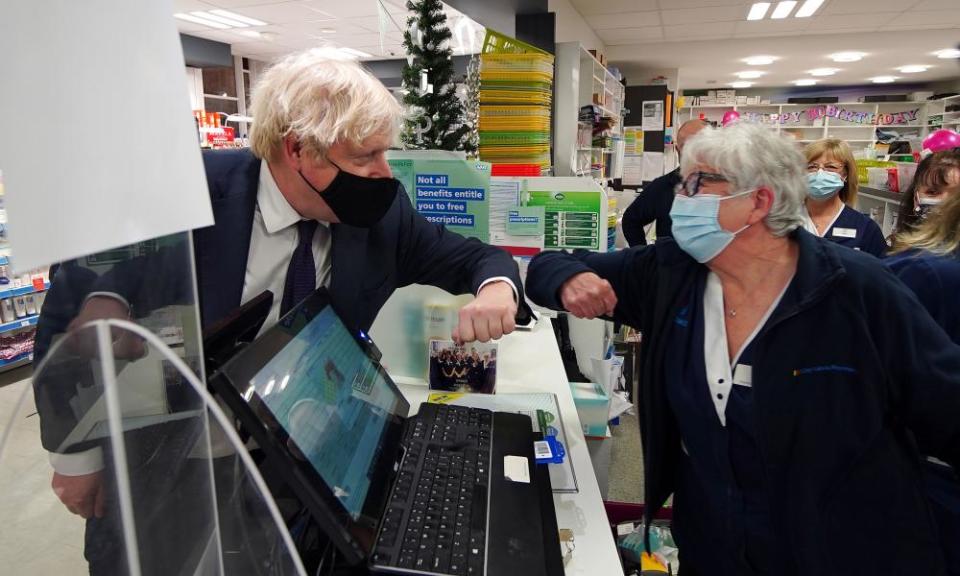‘They’re all at it’: North Shropshire shrugs off sleaze before byelection

At No 17 Noble Street, running off the high street in Wem, Shropshire, is the modest house in which the great 19th-century radical essayist William Hazlitt grew up. Nearly everything about Wem is modest, including the faded stone that commemorates Hazlitt’s inhabitance.
But perhaps this son of Wem should be more openly celebrated in the place where he spent his formative years. After all, Hazlitt defined a Tory as someone who “cries long life to the conqueror, and is ever strong upon the stronger side – the side of corruption and prerogative”.
And North Shropshire is a constituency that has been represented by Conservatives ever since Hazlitt’s day. What’s more, the most recent incumbent, Owen Paterson, had to resign following allegations of breaching parliamentary advocacy rules. There is a byelection on 16 December to find his successor.
Alas, no one mentioned the great man in Wem – Hazlitt, that is, not Paterson – when asked their opinion of politicians. It says something about the esteem in which our rulers are held, following stories about David Cameron’s lucrative lobbying and how PPE contracts were handed out, that the most common response was a knowing guffaw, as if they had been solicited on what they thought about extramarital sex.
“Ha ha!” said Peter Partridge, when the question was put to him. “Well in my case it’s going slowly downwards.” In this, Partridge is out of step with public opinion on the issue, which is going rapidly downwards, according to research carried out by the Institute for Public Policy Research.
Of course politicians have always been a handy target for public discontent, but being an MP was also once seen as a job commanding respect, particularly in rural communities like North Shropshire, where the elected representative frequently occupied a position of social distinction.
There was little of that kind of reverence on display in Wem. Nor was there much surprise about Paterson. “My response was ‘huh’,” said Helen Walton, shrugging her shoulders with weary indifference, as though her expectations were too low to be disappointed. However, she expressed a certain embarrassment that the allegations concerned her local MP.
One of the confusing things about the public’s attitude towards politicians is that while they get a low score in general, people tend to rate their local MP more highly. I was reminded of this paradox by a woman who didn’t want to give her name but said that although she had little faith in politicians in general, she thought Paterson was “a man of integrity”, and had simply been trying to pass on important information for the benefit of all.
But it’s the benefit to himself – as much as £500,000 paid for consultancy work by Randox and Lynn’s Country Foods, in addition to his salary as an MP – that tends to trouble people. I say trouble, but that’s not quite the right word, because so many people I spoke to in Wem and nearby Whitchurch believe that “they’re all up to it”. One woman called Patricia said she was a lifelong Conservative voter and she thought Paterson’s actions were typical of all MPs, “but at the end of the day, they’re only looking after their families”.
Many people seemed to process the fact of Paterson’s personal enrichment by assigning venality as a standard characteristic of all politicians. It’s this sense of being guilty by association that frustrates those many MPs who are scrupulous about not exploiting their position for personal gain.

Mark Peplinski, who works in the packaging business, was in town with his partner Emma Walton to get a booster jab. He said his children, who live in London, were sceptical about all politicians: “But I don’t really believe people go into politics to make money,” he said. “If that’s what you’re after, you wouldn’t choose politics. On the whole I think people go into politics for the right reasons but, you know, power corrupts.”
It was Boris Johnson’s attitudes to rule-breaking, he thought, that had helped empower those looking to cash in on their position.
Most people, it turned out, had only a sketchy sense of the case against Paterson, but what many cite as greater cause for concern was the revelation that No 10 held a Christmas party last year in apparent contravention of the Covid rules. It was the double standard that riled them rather than the misuse of public office.
It was notable that not a single person said Paterson’s actions would change the way they voted. But the byelection has nonetheless attracted the usual array of “colourful” figures – the Monster Raving Loony party and at least two candidates who are running on an anti-immigration platform, despite (or perhaps because of) the overwhelming whiteness of North Shropshire.
The Liberal Democrats are said to fancy their chances of staging one of their periodic spectacular gains. But while that may make headlines for a day, it will do little to change a political system and culture that appears to be fast losing its appeal to the voting public.
How to rebuild belief in our politics and politicians is both an urgent and long-term task. For anyone looking at what it may involve in North Shropshire and elsewhere, it’s worth bearing in mind something else Hazlitt said. “The love of liberty is the love of others: the love of power is the love of ourselves.” Maybe we’ve seen a little too much self-love in our political class of late.

 Yahoo Finance
Yahoo Finance 